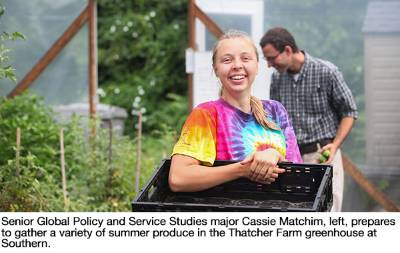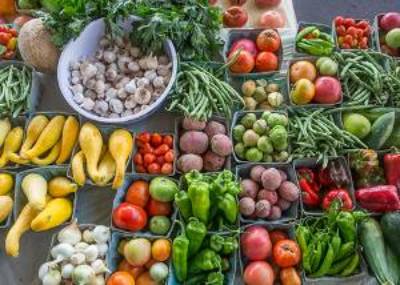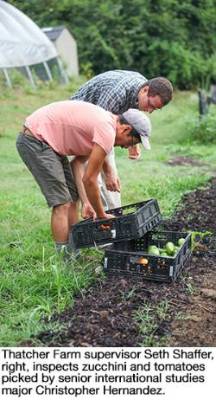Fruits (and Vegetables) of the Spirit

Seth Shaffer always considered his work with agriculture a kind of ministry, but he didn’t discover just how right he was until a passing chef caught a glimpse of his business card.
“Adventist?” the chef asked, stopping his work to face Shaffer. “Isn’t eating healthy a big part of who you guys are?”
Shaffer was stunned. He had been delivering five pounds of garlic to Easy Bistro, a restaurant in Chattanooga, when the question was posed. Shaffer hadn’t said anything about Adventists or the health message.
“Yes!” Shaffer said. “That’s a large part of what we do and a large part of our religion.”
The chef responded with a grin. “That’s why y’all are so healthy.”
Wow, Shaffer thought to himself, a smile growing on his face. He might not have felt comfortable going door to door or conducting Bible studies, but sharing his beliefs by starting conversations about farming and agriculture was easy for this 2013 Southern graduate who recently completed a master’s degree in sustainable food systems. With just fresh produce and a business card, he could witness in a completely different light.
That was one of the many gifts Thatcher Farm has delivered to him, the university, and the Chattanooga community.
Seed Is Planted
Thatcher Farm, Southern’s seasonal row-crop garden, began in 2012 to help facilitate the Sustainability Studies curriculum, a new class within the History and Political Studies Department. The course, part of the Global Policy and Service Studies (GPS) program, teaches students how to produce healthy food without harming the environment, allowing future generations to do the same. While this agricultural technique has several benefits for daily life, the goal is that these students take what they’ve learned and teach it to others, especially on mission trips to third-world countries which often suffer the most from poor farming practices.
 Knowing that it was pointless to instruct students on sustainable farming methods
without any actual hands-on experience, the department began using a small plot of
land behind a row of campus apartments. The farm later expanded to include a high
tunnel greenhouse, extending the growing season to include cold weather. Though only
a quarter of an acre in size, Thatcher Farm produces a large variety of seasonal crops.
In the spring, the land is usually colored with lettuce, kale, arugula, Swiss chard,
garlic, tomatoes, peppers, squash, eggplants, cabbage, beets, snap peas, and strawberries.
In the fall, radishes, turnips, and carrots are added to that list.
Knowing that it was pointless to instruct students on sustainable farming methods
without any actual hands-on experience, the department began using a small plot of
land behind a row of campus apartments. The farm later expanded to include a high
tunnel greenhouse, extending the growing season to include cold weather. Though only
a quarter of an acre in size, Thatcher Farm produces a large variety of seasonal crops.
In the spring, the land is usually colored with lettuce, kale, arugula, Swiss chard,
garlic, tomatoes, peppers, squash, eggplants, cabbage, beets, snap peas, and strawberries.
In the fall, radishes, turnips, and carrots are added to that list.
Since taking over the farm, Shaffer has found several outlets for the fruits of his labor. Every week, he sells the produce to a number of local businesses, including some vegan, vegetarian, and locavore restaurants in the trendiest parts of Chattanooga. Shaffer also takes produce to the fresh market every Sunday, along with the harvest from his family’s own 25-acre organic farm. Though most of the food from Thatcher Farm is sold to the community, some of it is circulated on campus, as well; when school is in session, a sizable amount of produce is sold to Southern’s cafeteria.
Many Hands, Light Work
There is plenty of work to do on the small farm. Seedlings need to be planted. Mulch needs to be moved. Weeds need to be pulled. Produce needs to be cleaned. It’s a lot for one man to handle when the class is not in session. Shaffer, peridicals manager for McKee Library on campus, visits the farm daily and volunteers several hours a week investing in its success. But luckily, Shaffer does not have to do it alone. Cassie Matchim, senior GPS major, is one of the two students who started working at Thatcher Farm after taking the Sustainability Studies class in the fall.
 “I’ve found it to be a really good stress reliever,” Matchim said. “Working with my
hands and actually seeing the fruits of my labor is rewarding.”
“I’ve found it to be a really good stress reliever,” Matchim said. “Working with my
hands and actually seeing the fruits of my labor is rewarding.”
Not long after Matchim and her classmate started tending the farm, two Collegedale Academy students and two community volunteers joined the farm’s support team.
Although Thatcher Farm generates some small amount of revenue, Shaffer said its primary purpose remains education. While the students from the Sustainability Studies course can certainly attest to this, they aren’t the only ones who have gathered lessons from the farm.
As part of a World Geography class, students paired into groups and devised a lesson plan dealing with agriculture. After becoming acquainted with Thatcher Farm themselves, the students took a group of local homeschoolers on a tour and taught them about water, sunlight, soil, and seeds, making sure to highlight relevant spiritual parallels along the way; the connections between a farmer’s work in the soil and a Christian’s work on Earth are many.
“You plant the seeds and that tiny little speck keeps growing,” Shaffer said. “And one day that produce on the vine is ready to harvest. At that point you pick it and say, ‘I had a part in growing this thing that wasn’t here before.’ It’s an amazing feeling!”